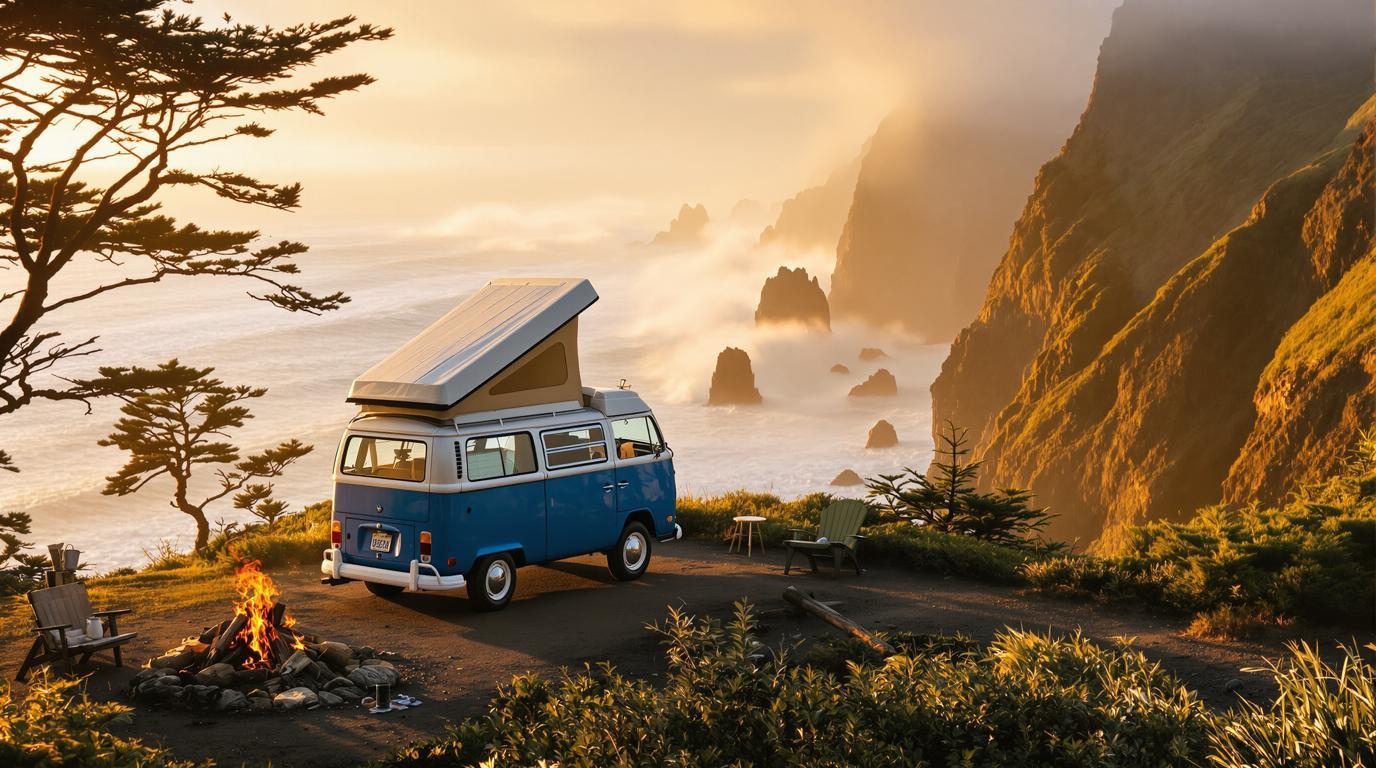I rented a VW van in Oregon and hit the open road for 5 days of pure, unadulterated freedom. There’s something magical about waking up to the rhythmic crash of Pacific waves against jagged cliffs, brewing coffee on a portable stove while golden dawn light filters through coastal fog. This wasn’t just a vacation – it was a soul-cleansing journey through America’s most spectacular coastline.
The perfect vessel for coastal exploration
My home-on-wheels was a lovingly restored 1970s VW Westfalia – compact enough to navigate winding coastal roads yet spacious enough for comfortable sleeping and basic cooking. With its pop-top roof and classic styling, it drew smiles and waves from fellow travelers. Oregon’s van culture runs deep, with rental companies in Portland offering everything from vintage buses to modern adventure rigs.
Cliff-edge camping with million-dollar views
The Oregon coast offers something rare in today’s world – places where you can legally park overnight with panoramic ocean views. At Cape Perpetua, I found a pull-out where my van perched above crashing waves. As darkness fell, I sipped local pinot noir while the horizon transformed into watercolor brushstrokes of orange and purple.
“The Oregon coast belongs to everyone,” a local told me at a roadside coffee stand. “That’s why we fight to keep public access to these views. They heal something in you that you didn’t know needed healing.”
The primal joy of campfire cooking
Each evening became a ritual: gathering driftwood along beaches, digging a small fire pit in designated areas, and preparing simple meals enhanced by wood smoke and salt air. I grilled fresh-caught fish purchased from dockside markets in small fishing villages like Depoe Bay. Nothing tastes better than food cooked over open flame with the soundtrack of crashing waves.
Nature’s lullaby: falling asleep to ocean rhythms
The nightly symphony of waves became my sleep aid. At beaches that transform into natural platforms for stargazing, I’d leave the van’s windows cracked to let in the perfect white noise of the Pacific. Some mornings, I’d wake to find harbor seals curiously eyeing my campsite from offshore rocks.
The joy of spontaneous discovery
Without rigid itineraries, I followed whims and local recommendations. A hand-painted sign led me to Thor’s Well, a natural sinkhole that creates spectacular water explosions at high tide. Another day, I hiked through ancient Sitka spruce forests that felt like stepping into a Tolkien novel. Much like Tasmania’s stunning orange-boulder beaches, Oregon’s coastline reveals unexpected natural wonders around every bend.
Hidden beaches and secret coves
The real magic happened when I ventured off Highway 101. Near Yachats, a local fisherman directed me down an unmarked dirt road to a beach where agate hunters sift through sand by day, and at night, the Milky Way reflects in tide pools. These secluded spots offer solitude that rivals even Estonia’s wilderness shipping container retreats.
“We call this coast the edge of the world,” explained a retired park ranger I met at Cannon Beach. “It’s where the continent finally surrenders to something larger than itself.”
The vanlife community
I found instant camaraderie with fellow van travelers at places like Cape Blanco State Park. We shared route tips and secret parking spots while comparing van setups. Unlike medieval French villages suspended between earth and sky, these temporary communities form and dissolve like morning mist, yet connections feel authentic and lasting.
The perspective that only the road provides
There’s something about driving a vintage van that forces you to slow down. Maximum speeds of 55mph meant enjoying the journey rather than racing to destinations. I found myself pulling over for views that would normally blur past, discovering tide pools reminiscent of beaches that glow electric blue at night (though with Pacific anemones instead of flamingos).
As I reluctantly returned my van to Portland, I realized what made those five days so precious wasn’t just Oregon’s dramatic beauty, but the raw freedom of living entirely in the present. The van wasn’t just transportation – it was a portal to a simpler existence where sunset locations were chosen by instinct, meals determined by local catches, and each day shaped only by tide tables and whimsy. The road awaits your own journey of discovery.
